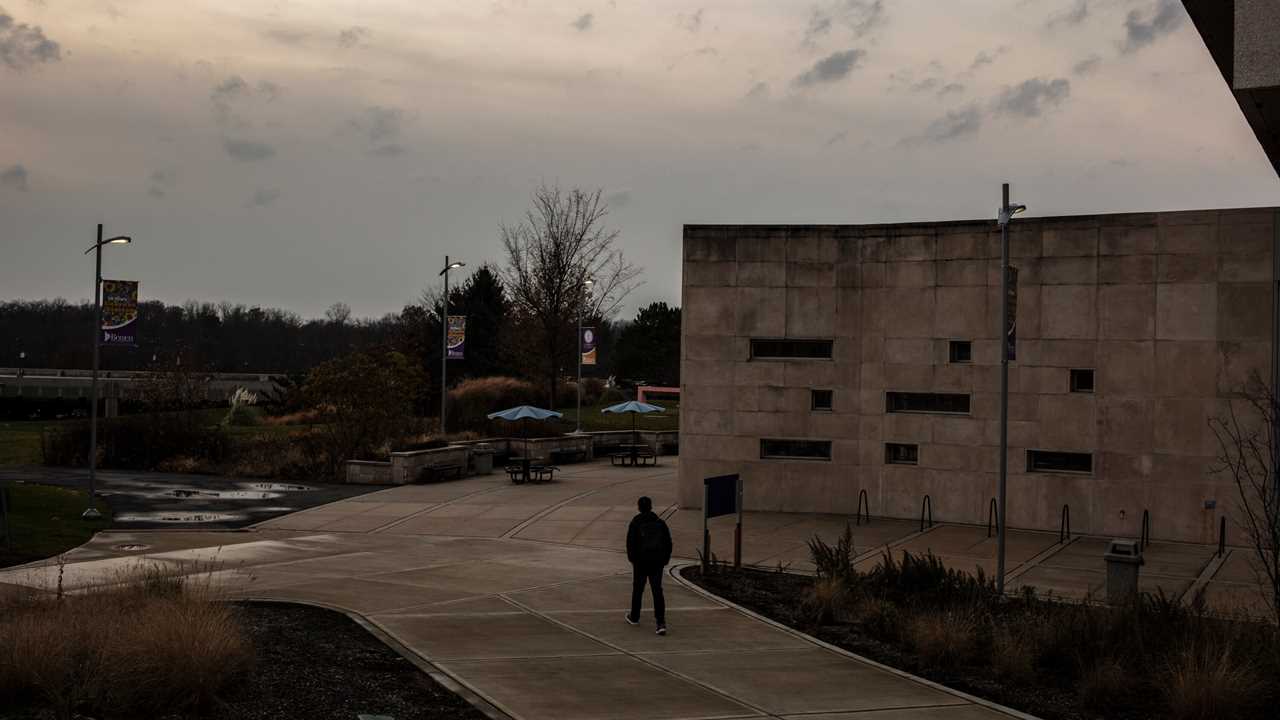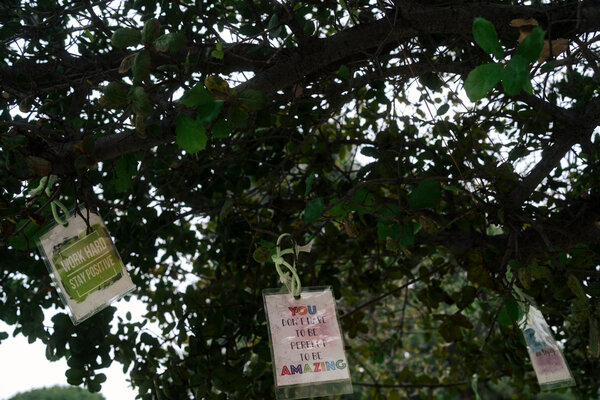
This article addresses mental health issues on college campuses, including suicide. If you are having thoughts of suicide, call the National Suicide Prevention Lifeline at 800-273-8255 (TALK) or go to SpeakingOfSuicide.com/resources for a list of additional resources.
The mood was already strained at West Virginia University as students hunkered down for finals in December. Then an employee found an anonymous letter in a men’s bathroom, embellished with illustrations and poetry, that threatened suicide in or around the student union at noon on Monday, Dec. 6.
Still reeling from a very public suicide of a 20-year-old business major in April, the university administration reacted swiftly. Officials posted a warning, highlighted in canary yellow, on the university’s website, pleading with the letter’s author to seek help, and asking students to be alert to their surroundings.
“While we do not know your personal circumstances, we do know this is a very stressful time of year,” the university wrote, adding, “You are not alone.”
As Monday came and went without incident, students and university officials expressed relief, but worried that the note was just one indicator of the fragile mental health of many students during the turmoil of the coronavirus pandemic.
“People were disturbed and scared,” Emilie Charles, a sophomore at the university, said. “It’s a hard time for everybody. A lot of us had to grow up pretty quickly this semester.”
Colleges across the country are facing a mental health crisis, driven in part by the pandemic. After almost two years of remote schooling, restricted gatherings and constant testing, many students are anxious, socially isolated, depressed — and overwhelming mental health centers. At a few institutions, there has been a troubling spate of suicides.
Now another swell of Covid cases, driven by the Omicron variant, threatens to make life on campus worse.

In the last few days, the list of universities that will go remote for at least the first few weeks of January has grown, and includes Stanford, Southern New Hampshire, DePaul, Northwestern, University of California, Los Angeles, and the University of Illinois Chicago.
Other colleges, including Bowie State, Cornell, Princeton and Towson, moved exams online and urged students to go home for winter break as soon as possible.
As cases surge, a big question is what campus life will look like in January. Will classes be remote? Will students be able to gather? Will there even be campus life?
Loneliness or isolation, along with loss of motivation or focus, are among the top concerns of college students who have sought counseling during the pandemic, according to national data collected by the Center for Collegiate Mental Health at Penn State.
Some administrators worry that there is a conflict between protecting students’ physical health and their mental health. “Restricting the ability to interact, there’s a price to pay for all that,” said Eli Capilouto, president of the University of Kentucky. “Somebody said if we’re not careful, we’re going to trade one epidemic for another, and in many ways I think we are.”
To many students, the latest virus surge feels like a giant step back to the netherworld, where college just was not college.
“It’s just ‘Waaaaaah!’ That’s how I would describe it,” said Ally Montgomery, a freshman majoring in comedy arts at DePaul University.
When she heard that the first two weeks of winter classes would be online, she felt a sense of panic. She had missed all the rituals of senior year in high school — a real prom, college tours, graduation. She even missed the beginning of college last fall, because she tested positive for Covid.
Now real college could be going up in smoke.
Over the past decade, the rate of depression, anxiety and serious thoughts of suicide has doubled among college students, according to Daniel Eisenberg, a professor at U.C.L.A. and a principal investigator of the Healthy Minds Study, an annual survey of thousands of students across the country.
And the pandemic has only intensified those trends. Students reported lower levels of psychological well-being during the pandemic than before, according to a survey by the Healthy Minds Network and the American College Health Association. On the plus side, they reported higher levels of resiliency.
“The water level seems like it has only crept up a little bit during the pandemic, but underneath the surface some people have been enormously harmed,” Dr. Eisenberg said.
The academic atmosphere is tense. At the height of the pandemic, professors were more lenient, grading pass/fail and extending deadlines. In the most recent semester, students say, they have gone back to the stricter attitudes of the past, not recognizing that some mercy may still be needed.
“You can just look around you and tell people need a rest,” said Flora Durgerian, a senior at Claremont McKenna. “I’m overwhelmed,” she added.
Many parents and college administrators have been troubled by an outbreak of suicides. Among them: Three, all first-year students, since November 2020 from Dartmouth; two, and possibly more, since July from Worcester Polytechnic Institute; two in September from St. Louis University; three in September and October from the University of North Carolina at Chapel Hill; and from Yale and Princeton.
It is unclear whether the number of suicides is going up.
But Colleen Wamback, a spokeswoman for Worcester Polytechnic, said the toll there had been “unprecedented.” The school had two suicides from 2006 to June 2021, she said. In the past six months, there have been four deaths, two of them confirmed suicides and two others still under investigation.
There have been at least two suicides connected with West Virginia University since the pandemic began. Eric Domanico, a freshman on full scholarship there, died of suicide in July 2020, soon after students were sent home in the first wave of the pandemic.
Eric was already emotionally fragile, his father, Frank Domanico, said. Remote learning was a “disaster” and he missed his friends at school.
“My son died of loneliness,” Mr. Domanico said. “He didn’t have his friends, he didn’t have his support group.” Given a choice, he said, “I would rather die of a microbe than of loneliness.”
In a poignant forecast of the perils of isolation, The Yale Daily News interviewed Rachael Shaw-Rosenbaum, a first-year student from Anchorage, Ala., in the fall of 2020 as she moved into her dormitory room alone — because of Covid restrictions — and went into pre-emptive quarantine. She was not afraid of Covid, Ms. Shaw-Rosenbaum told the paper in a Zoom interview; she was afraid for her mental health.
“So I moved myself in for a couple of hours, and cried,” she said.
In March, before she could finish her first year, she died of suicide in her dormitory room.
Bergen Community College, in suburban New Jersey, lost a student to suicide this semester, and demand for therapy has “exploded,” said Jennifer Migliorino-Reyes, the dean for student support. Her students often are balancing work, children and school — and can be under enormous financial pressure. “Definitely threats of suicide, anxiety attacks, not knowing how to socialize,” she said. “I’m not going to lie: It’s been exhausting.”
Cassie Guinto, a second-year student there, offered tutoring services this semester to first-year students. But she noticed that many students who sought academic help did not need it.
Tips for Parents to Help Their Struggling Teens
Are you concerned for your teen? If you worry that your teen might be experiencing depression or suicidal thoughts, there are a few things you can do to help. Dr. Christine Moutier, the chief medical officer of the American Foundation for Suicide Prevention, suggests these steps:
“They needed to talk,” she said.
They had been shut inside in their last year of high school. And they told her, “I have no clue how college works.”
University of Kentucky officials said they were especially worried about first-year students, who seemed to have a harder time adjusting than earlier generations.
“This generation has had this long adolescence, and they hadn’t separated” from their families, said Kirsten Turner, the university’s vice president for student success.
Princeton, where a student died by suicide while studying remotely last spring, has seen a 15 percent increase in demand for services, a record.
“More students were reporting various cases of homesickness, where they really felt kind of lost about not having their parents around” said Calvin R. Chin, the school’s director of counseling and psychological services.
There is no doubt that missing a large chunk of college has changed the social dynamic on campus, as if students were all Rip Van Winkles, returning from a long slumber.
Josh Nagra went home to lockdown as a freshman at Claremont McKenna College and returned to the California campus this fall as a junior. In that time, he found, everyone had changed, and he could no longer rely on the same friends.
“People came back to college thinking that they had all of these friend groups,” he said, adding, “but you’re now much different people and fully two years older.”
There was a loss of connection, he said.
Students are asking for help. More than 9,000 people signed a petition asking for more mental health services at Saint Louis University. The student government at West Virginia University is asking for state aid. The Domanico family has started a foundation in Eric’s memory. “A year from now we’re going to find out we have a lot more kids with these issues, and we’re not going to know what to do,” Mr. Domanico said.
At Yale, alumni, family and friends of Rachael Shaw-Rosenbaum founded Elis for Rachael, trying to influence the university’s mental health policies. The pandemic pushed her over the edge, her mother, Pamela Shaw, said in a phone call from Anchorage. She had tried to convince her daughter to take a gap year until the pandemic receded. “This is not what college is like,” she told her.
But Rachael, she said, could not see that “this is just a blip in time.”
Sheelagh McNeill, Susan C. Beachy and Kirsten Noyes contributed research.
Title: Another Surge in the Virus Has Colleges Fearing a Mental Health Crisis
Sourced From: www.nytimes.com/2021/12/22/us/covid-college-mental-health-suicide.html
Published Date: Wed, 22 Dec 2021 14:47:08 +0000






